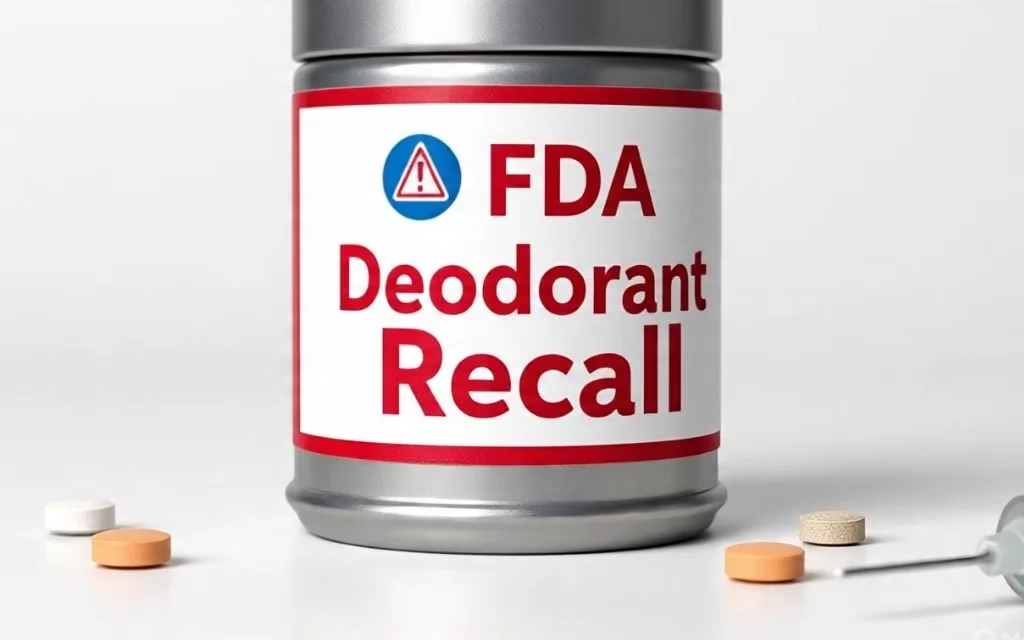The topic of the FDA deodorant recall has gained significant attention as consumers are becoming increasingly aware of product safety standards and the ingredients used in personal care products. Over the years, the Food and Drug Administration has issued recalls on various products due to harmful or unsafe substances. When a FDA deodorant recall occurs, it is usually linked to concerns such as contamination, harmful chemicals, or incorrect labeling.
The primary aim of a FDA deodorant recall is to ensure public health and safety by removing potentially dangerous deodorant products from store shelves. This move has also raised awareness about what goes into the deodorants we use daily. Many people are now paying closer attention to ingredient lists, opting for natural or organic options, and staying updated on official FDA safety alerts.
In this article, we will cover every aspect of the FDA deodorant recall, including the reasons behind it, the harmful chemicals detected in some deodorants, the brands affected, and what steps consumers should take if they have purchased recalled products. We will also discuss how to choose safer deodorant alternatives and why it is crucial to be aware of FDA guidelines for personal care products.
Understanding the FDA Deodorant Recall Process
When a FDA deodorant recall is issued, it means that the product has failed to meet safety standards set by the Food and Drug Administration. The FDA, in collaboration with manufacturers, initiates recalls when products are found to pose potential health risks.
The recall process usually starts after routine testing or consumer complaints reveal unsafe levels of harmful chemicals like benzene, which is a known carcinogen. In some cases, deodorant sprays or roll-ons have been recalled because they were contaminated during the manufacturing process.
It is important to note that deodorants and antiperspirants are classified as over-the-counter products. While the FDA regulates their safety, it is the responsibility of the manufacturer to ensure that products are safe before they reach consumers. If a company fails to follow these guidelines, a FDA deodorant recall is issued to prevent any adverse effects on public health.
Why Do FDA Deodorant Recalls Happen
There are multiple reasons behind a FDA deodorant recall. One of the most common reasons is the detection of harmful chemicals such as benzene or formaldehyde. These chemicals can cause serious health issues, including skin irritation, respiratory problems, and long-term risks like cancer when used over an extended period.
Another reason for recalls is improper labeling. If the ingredients listed on the deodorant packaging do not accurately reflect the actual contents of the product, it could mislead consumers, leading to potential allergic reactions or other harmful effects.
Manufacturing errors are another leading cause of recalls. Contamination during the production process can introduce harmful bacteria or toxic chemicals into deodorant products. The FDA deodorant recall ensures that these contaminated items are removed from the market quickly to protect consumers.
Recent FDA Deodorant Recalls and Affected Brands
In recent years, there have been several notable FDA deodorant recall events. Some popular deodorant brands were found to have unsafe levels of benzene, prompting the FDA and the manufacturers to pull these products off store shelves.
One high-profile recall involved spray deodorants from major brands where routine testing discovered traces of benzene contamination. Consumers were advised to stop using these products immediately and either dispose of them or return them for a refund.
The FDA deodorant recall has made consumers more cautious, leading to increased demand for safer and natural deodorant alternatives. While the recalls can cause temporary concern, they also highlight the importance of strict product testing and quality control in the personal care industry.
Health Risks Linked to Recalled Deodorants
The FDA deodorant recall is not just about compliance with regulations; it is about preventing serious health risks. One of the primary concerns is the presence of benzene, which has been classified as a human carcinogen. Prolonged exposure to benzene can increase the risk of developing certain types of cancer, particularly leukemia.
Other harmful chemicals sometimes found in deodorants include formaldehyde, parabens, and phthalates. These chemicals can cause skin irritation, hormone disruption, and respiratory issues. The FDA deodorant recall ensures that products with these harmful ingredients are quickly removed from circulation to minimize consumer exposure.
People with sensitive skin or pre-existing health conditions are particularly vulnerable to harmful chemicals in deodorants. That is why it is crucial for everyone to stay informed about current recalls and choose products that are free from toxic ingredients.
How to Know If Your Deodorant Is Affected by an FDA Deodorant Recall
If you suspect that your deodorant might be part of an ongoing FDA deodorant recall, there are a few steps you can take. The FDA regularly updates its website with lists of recalled products, including brand names, batch numbers, and expiration dates.
You can also check the official website of the deodorant manufacturer for recall announcements. Most companies issue public statements and provide instructions on how to return or safely dispose of recalled items.
It is always a good idea to stay connected with consumer safety organizations and news outlets, as they often report on major FDA deodorant recall events. Keeping track of this information can help you avoid using harmful products and protect your overall health.
Consumer Response to FDA Deodorant Recalls
When a FDA deodorant recall is announced, consumers are advised to immediately stop using the affected product. Companies typically offer refunds or replacements for recalled items. Some brands also provide guidance on safe disposal methods to prevent environmental harm.
The recalls have also influenced consumer behavior. Many people are now choosing aluminum-free deodorants or products labeled as organic and natural. This shift is largely driven by concerns about synthetic chemicals and the potential health risks they pose.
How Manufacturers Handle FDA Deodorant Recalls
For manufacturers, a FDA deodorant recall can be both a challenge and an opportunity to regain consumer trust. When a recall is initiated, companies must quickly remove affected products from all retail locations, issue public statements, and work closely with the FDA to resolve the issue.
Many manufacturers also conduct thorough investigations to determine how the contamination or issue occurred. They then implement stricter quality control measures to prevent future problems. A successful recall process not only protects consumers but also helps rebuild brand reputation.
Alternatives to Recalled Deodorants
The FDA deodorant recall has encouraged many people to explore safer alternatives. Natural deodorants, which use plant-based ingredients like baking soda, coconut oil, or essential oils, are becoming increasingly popular. These products are free from harmful chemicals like benzene and aluminum.
Consumers looking for alternatives should consider brands that are transparent about their ingredients and have been tested for safety. Reading product labels and looking for certifications such as cruelty-free or organic can also help ensure that the deodorant you choose is safe.
The Role of the FDA in Ensuring Product Safety
The FDA deodorant recall highlights the role of the Food and Drug Administration in protecting public health. While deodorants are considered cosmetic products, the FDA still monitors their safety and can take action when harmful ingredients are detected.
The FDA does not approve deodorants before they hit the market, but it does have the authority to intervene when products are found to be unsafe. Through recalls, warnings, and investigations, the FDA ensures that manufacturers are held accountable for the quality and safety of their products.
What Consumers Can Learn From FDA Deodorant Recalls
The most important lesson from a FDA deodorant recall is the importance of being an informed consumer. Always check product labels and research the ingredients used in personal care products. Avoid products with potentially harmful chemicals and opt for trusted brands that prioritize safety and transparency.
Another lesson is to stay updated with FDA announcements. Recalls can happen unexpectedly, and being aware of them can help prevent unnecessary health risks.
Steps to Take If You Have a Recalled Deodorant
If you discover that your deodorant is part of an ongoing FDA deodorant recall, you should stop using it immediately. Most companies will allow you to return the product for a full refund. If you experience any irritation or adverse reactions from using a recalled deodorant, it is advisable to seek medical attention and report the issue to the FDA’s MedWatch program.
The Future of Deodorant Safety
The FDA deodorant recall has prompted many manufacturers to improve their testing processes and invest in safer formulations. As consumer demand for natural and chemical-free products grows, the personal care industry is shifting towards more transparent labeling and higher safety standards.
Future deodorants are likely to feature fewer synthetic chemicals, with more focus on plant-based ingredients and environmentally friendly packaging. This trend is not only beneficial for personal health but also for the environment.




